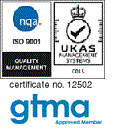 |
 |






 |
Friday, 13th November 2012
GB Precision Automates to Cover Holiday Periods
 |
With this years Christmas and New Year holidays both falling midweek, some engineering companies could find that their subcontract suppliers are closed for an extended period. However, at GB Precision highly automated processes mean business-as-usual over the shutdown period, ensuring customers in sectors such as packaging, food, drink, pharmaceutical and cosmetics can continue to meet their own deadlines without fear of delays.
Following a planned and ongoing programme of investment, this progressive business is making quite a name for itself among a growing list of customers. With optimised, high quality manufacturing processes, technology provides the heartbeat at GB Precision. Taking centre stage at the company’s facility is an automated five-axis CNC machining and die sink EDM cell complete with System 3R WorkMaster robot. This facility not only provides the unfailing repeatability necessary to deliver total quality on a right-first-time basis, it also enables unmanned, lights-out operation. As a result, holidays such as Christmas and New Year no longer have to interrupt important production schedules.
A Röders RXP500DS high speed milling machine and an Agie Hyperspark Exact die sink EDM are served by the WorkMaster robot, which loads workpieces onto both machines. The high specification robot was selected for its flexibility and in order to future-proof the cell; GB Precision’s plans include expanding the system to include tool loading for both the Röders and the Agie. In addition, the Workmaster can be modified to become a “linear robot” running on a track and serving a number of machines, which may be added at a later date.
The high specification Röders makes GB Precision the envy of many competitors. The machine offers laser tool probing and part probing, along with linear motors in all fives axes. Linear motor technology means there are no ballscrews and therefore no wear takes place, making it ideal for producing accurate parts consistently.
The WorkMaster robot is a flexible, modular automation system that changes large and small pallets between magazines and multiple machines in the same production cell. Although serving two machines at GB Precision, its modularity means that the company can add one or more machines to increase production capacity in step with business growth.
“Over Christmas we have planned a production schedule in the automated cell that runs unattended for 112 hours,” states Paul Turner, director at GB Precision. “After this time we will make a short visit to re-load the machine with another 112 hours of work. As well as helping us keep up with orders over the holiday period, the automated cell also means we can shorten lead-times.”
Previously, GB Precision was running an existing graphite machining centre 15 hours a day. However, this wasn’t enough. An expanding order book meant the company had to make the step up to 24/7 operations, a decision that led first to the acquisition of the Röders machine and subsequently the WorkMaster robot. The robot is in fact the third System 3R unit on site – two existing WorkPal robots serving two other Agie EDM machines elsewhere at GB Precision’s facility.
“As an existing System 3R user we already had many pallets,” says Mr Turner. “In our automated cell we are using four different pallet systems, all from System 3R, giving maximum flexibility. These go from the largest at 280 x 280 mm down to 32 x 32 mm, although the cell also features the Macro Magnum pallet system with 156 mm diameter which is new to GB Precision.”
Customers can have complete peace of mind using GB Precision’s automated cell, which is programmed to reach a safe stop should the system ever detect fault or error.
“Bearing in mind that these operations are achieving repeatability at micron level, confidence in the systems capability is paramount. If a pallet was missing, misloaded or dirty and did not seat correctly the system would immediately detect the problem and stop the cell,” explains Mr Turner. “This is vitally important as the materials can be worth thousands of pounds – let alone the cost of the associated time and work.”
Although installed originally to machine graphite electrodes, realising its benefits, GB Precision now also use the Röders RXP500DS for machining hardened steel up to 60Rc, making it ideal for producing mould tool inserts. At present, workpieces and electrodes are produced in a shared workflow, which typically comprises 50-60 electrodes and eight items of hard metal machining, although the mix is infinitely variable.
|
 |
|